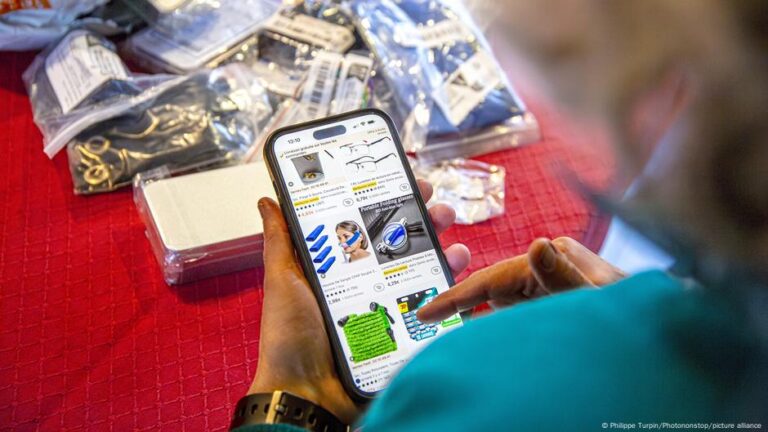US President Donald Trump’s scrapping of a duty-free loophole has shattered Temu and Shein’s business model, choking their flood of cheap Chinese goods into the United States.
In 2024, 1.36 billion shipments entered the US under the so-called de minimis rule, exempting goods valued under $800 (€704) from import tariffs. That figure marks a nine-fold increase from 153 million in 2015.
Goods bought from Temu and Shein, who handled 30% of daily US low-value packages last year between them, will now be subject to a 30% tariff or flat fees of up to $50, plus the 145% tariff on imports from China levied by Trump last month.
With prices to US consumers more than doubling, these retailers’ profit margins are crumbling. So, Temu and Shein will likely double down on Europe, exploiting the European Union’s de minimis loophole to sustain their low-cost model.
Europe plans to scrap de minimis loophole
Though lower than the US limit, the EU’s €150 ($170) exemption hasn’t slowed Temu and Shein’s explosive growth. In 2024, 4.6 billion low-value parcels flooded the EU market — a doubling from 2023 and tripling from 2022, with 91% coming from China.
Those 12.6 million daily packages are delivered duty-free, undercutting European retailers burdened by higher labor, supply chain and compliance costs. Unlike their Chinese rivals, EU firms also don’t benefit from favorable international postal rates.
Although the European Commission proposed scrapping the EU de minimis exemption two years ago, the plan still awaits approval from the 27 EU member states and the European Parliament. The axe isn’t expected to fall until 2027 at the earliest, according to news agency Bloomberg.
This delay offers little relief to those European firms already facing fierce Chinese competition, from e-commerce to solar panels and electric vehicles (EVs), who now must face Trump’s US tariffs diverting more of China’s low-cost EVs and goods to Europe.
Many EU merchants fear this could mean Temu and Shein will dump even more cheap products on European markets, putting them out of business.
Chinese goods often fail safety tests
Beyond threatening to dampen profitability and elicit layoffs among EU firms, this influx of cheap goods raises much bigger alarms over product safety.
Agustin Reyna, director general at BEUC, a Brussels-based lobby of European consumer organizations, said groups like his have collected “extensive evidence” of Chinese goods — from toxic makeup and clothing, to faulty toys and appliances — failing EU safety standards.
“We need extra tools to tackle the influx of unsafe products entering Europe via small parcels, often purchased on platforms like Temu,” Reyna told DW. “Consumers are unknowingly putting their health and safety at risk.”
In January, the European Commission promised strict new controls on Chinese retail platforms to prevent “unsafe, counterfeited or even dangerous” products from entering Europe. European Trade Commissioner Maros Sefcovic called on European lawmakers to impose a handling fee on Chinese parcels to cover their soaring compliance costs.
Many policymakers want to hold online platforms directly responsible for the sale of dangerous and fake products. Currently, marketplaces like Temu act as intermediaries, not sellers, evading direct liability. This creates a huge headache for customs authorities and regulators.
“With over 12 million parcels entering the [EU] single market every day, it’s simply unrealistic to expect customs to act as the last line of defense,” said Reyna. “So, it is essential to make online marketplaces accountable for the safety and compliance of the products they sell to European consumers.”
VAT fraud a growing issue
There’s growing evidence of other illicit practices by Chinese sellers, including underdeclaring the value of the goods to avoid sales or value-added taxes (VAT). These range from 20% to 27%, depending on the EU state.
“There are many cases where importers declare an incorrect value for their consignments to fall below the threshold and avoid customs formalities,” Momchil Antov, an economist and customs expert at the D. A. Tsenov Academy of Economics in Bulgaria, told DW. “This is fraud.”
Last month, the EU’s anti-fraud office OLAF and Polish authorities uncovered a sophisticated VAT fraud scheme involving Chinese goods imported into the EU. Fraudsters claimed the goods were headed for other EU states to avoid tax and customs duties. In reality, the goods mostly stayed in Poland.
In another example, from 2023, Chinese exporters used Belgium’s Liege Airport to evade €303 million in taxes using a complex system involving private customs agencies and fake companies in other EU countries.
France plans ‘fraud control’ measures
While the European Commission’s plan to scrap the €150 exemption remains held up, some EU states have taken up Sefcovic’s suggestion. France’s government said last week it would step up inspections on low-value goods entering the country.
The imports will be analyzed for product safety, labeling standards and environmental standards and Paris will charge a flat-rate “management fee” on each parcel.
European policymakers will have to curb fraud, ensure compliance and promote fair competition without limiting consumers’ access to affordable goods from Chinese retailers.
Edited by: Uwe Hessler


